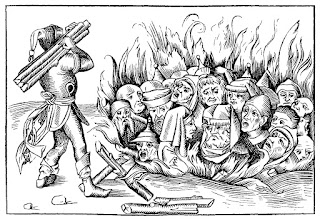The Massacre of a Kabbalist and his followers in Polonnoe, 1648
Polonnoe
July, 1648
Nathan Hanover was the author of Yeven Metzula, one of the main Jewish sources that tells of the Chmielnicki Massacres. In that book, he tells of the death of his teacher, Rabbi Samson, a Kabbalist, in the city of Polonnoe.
"Every day an angel would come to him and learn with him the secrets of the Torah. The Kabbalist wrote a commentary on the Zohar based on the Kabbala of the Ar"i, but it was never published. The angel told him before the pogrom that they needed to repent greatly, so as to avoid the evil decree. So he spoke several times in the synagogue and warned the people to repent, and on the impending tragedy. And they did repent, in all the communities, but it was to no avail, since the decree was already sealed. When the cruel enemies reached the city, the kabbalist went to the synagogue with three hundred wise men, all dressed in shrouds and their prayer shawls on their heads, and they busied themselves with prayer, until the enemies reached the city and killed all who were in the synagogue, on holy ground. Others who were not killed were forced to renounce their faith, and others were taken hostage.
Yeven Metzula was a popular book in the Jewish world, and stories like this which appear in it played an important role in cementing the motif of synagogue massacres in the collective conscience of the Jewish people.
July, 1648
Nathan Hanover was the author of Yeven Metzula, one of the main Jewish sources that tells of the Chmielnicki Massacres. In that book, he tells of the death of his teacher, Rabbi Samson, a Kabbalist, in the city of Polonnoe.
"Every day an angel would come to him and learn with him the secrets of the Torah. The Kabbalist wrote a commentary on the Zohar based on the Kabbala of the Ar"i, but it was never published. The angel told him before the pogrom that they needed to repent greatly, so as to avoid the evil decree. So he spoke several times in the synagogue and warned the people to repent, and on the impending tragedy. And they did repent, in all the communities, but it was to no avail, since the decree was already sealed. When the cruel enemies reached the city, the kabbalist went to the synagogue with three hundred wise men, all dressed in shrouds and their prayer shawls on their heads, and they busied themselves with prayer, until the enemies reached the city and killed all who were in the synagogue, on holy ground. Others who were not killed were forced to renounce their faith, and others were taken hostage.
Yeven Metzula was a popular book in the Jewish world, and stories like this which appear in it played an important role in cementing the motif of synagogue massacres in the collective conscience of the Jewish people.


Comments
Post a Comment